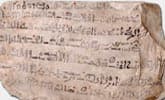The Tale of Sinuhe
 Tale of Sinuhe ostracon
Tale of Sinuhe ostraconAlso called
Sinuhe, The Story of Sinuhe
First publication
c.1875 BCE
Literature form
Story
Genre
Adventure
Writing language
Middle Egyptian
Author's country
Egypt
Length
Approx. 19,000 words
Notable lines
The hereditary noble and commander, warden and district officer of the estates of the sovereign in the lands of the Asiatics,1 this truly beloved royal acquaintance, the follower Sinuhe, said:
I was a follower who followed his lord, a servant of the king's harem and of the hereditary princess, greatest of praise, wife of Senwosret in Khnumet-sut and daughter of Amenemhet in Ka-nofru, Nofru, the possessor of an honored state.
— First lines, trans. W.K. Simpson
Thirst's attack overtook me, and I was scorched, my throat parched. I said, "This is the taste of death."
At night-time I strung my bow, and tried my arrows. I drew out my dagger, and polished my weapons. Day dawned and Retenu was already come; it had stirred up its tribes and had assembled the countries of a half of it, it had planned this fight. Forth he came against me where I stood, and I posted myself near him. Every heart burned for me. Women and men jabbered. Every heart was sore for me, saying: Is there another mighty man who can fight against him? Then his shield, his battle-axe and his armful of javelins fell, when I had escaped from his weapons and had caused his arrows to pass by me, uselessly sped; while one approached the other. I shot him, my arrow sticking in his neck. He cried aloud, and fell on his nose. I laid him low with his own battle-axe, and raised my shout of victory over his back. Every 'A'am shrieked.
— trans. Alan H. Gardiner
There is no poor man for whom the like hath been done; and I enjoyed the favours of the Royal bounty until the day of death came.
IT IS FINISHED, FROM THE BEGINNING TO THE END, ACCORDING AS IT WAS FOUND IN WRITING.
— Last lines, trans. Alan H. Gardiner

